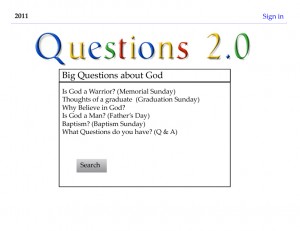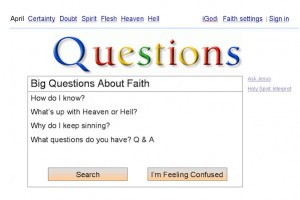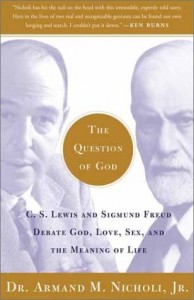
Hello: My Name Is Sycamore Creek Church – Curious
Sycamore Creek Church
January 4/5, 2014
Tom Arthur
Happy New Year, Friends!
I bet you ask lots of questions about God, faith, and life. I know I do. I’ve always been full of questions about the faith. I grew up in a Christian home, and prayed for Jesus to come into my heart when I was five years old. It was a real commitment, but the commitment of a five-year-old needs to grow as that five-year-old grows. As I got into high school I began asking lots of questions about this whole faith and Jesus thing.
When I was in high school I set up a meeting with my pastor to ask him a question that came up during my time of reading the Bible. Why did Jesus tell people not to say who he was after he had healed them? That was the beginning of my formal search for answers to my questions. I remember that meeting with my pastor, whose name happened to be Tommy, a very good meeting. I wasn’t chastised for asking questions about the Bible. He even seemed encouraged that I was asking questions about the Bible. There even seemed to be a pretty good answer to that particular question. Either Jesus was still figuring out what kind “messiah” he would be or he was concerned that his healings would lead to crowds that wanted him to be a “king.”
When I got into college, some of those questions led me to leave the Christian faith for a while. What I found out when I left Christianity was that there wasn’t any more certainty on the side of unbelief. The only difference was that unbelief seemed to offer no ultimate hope or meaning, whereas belief offered ultimate meaning and hope. Eventually I came back to put my trust in Jesus, in spite of the uncertainty I felt. But the questions remained. Here are some of the questions I’ve asked over the years:
- If you have to hear about Jesus to go to heaven, what happens to the Native Americans?
- Why should I trust the Bible? Are there any errors in the Bible?
- Why are there two different stories of creation in the Bible?
- Did Adam and Eve have belly buttons?
- If Cain and Able were the first children of Adam and Eve, then who did Cain marry? His sister?
- Where do the dinosaurs fit in?
- How can evolution and faith work together? Can they?
- What am I supposed to do with all these seemingly arcane rules in the Old Testament?
- Why does God tell the Israelites to wipe out everyone, including all the children and even the animals?
- Is it OK to swear?
- If sex outside marriage is wrong, what exactly is sex? Does oral sex count?
- What does God think about people with same sex attraction?
- What if the Greek for “faith in Jesus” can also be translated “faith(fullness) of Jesus” as I learned in my seminary Greek classes? What does that mean for what I believe that we are not saved by “faith in Jesus” but by the “faithfulness of Jesus?”
So while I’ve always been very curious about questions of faith, God, and life, I’ve mostly committed to following Jesus except for that short time in college. My curiosity and my commitment have always made me just a little bit weird.
I’m not the only one asking questions. I asked my friends on Facebook what questions they’ve asked about faith, God, and life. Here are some of their questions:
- If faith is a gift from God (Eph 2:8), then does God not give some that gift so they can be saved? Does God draw everyone? (John 6:44) What is a person’s part in faith?
- How does God care about a little speck of dust like me when He created the universe? Why is it so hard to obtain faith when it’s so free to have it?
- How do I make the church relevant in my life?
- Why does it seem like most people who don’t believe in God, choose to come to God when they are having difficulty in life?
Here’s some good news for all the question askers at Sycamore Creek Church and in our community. Sycamore Creek Church is curious, creative, and compassionate. We’re starting a three-week series today called “Hello: My Name Is Sycamore Creek Church.” We’re going to spend three-weeks introducing ourselves to the community and remembering what hasn’t changed, even if we have changed our Sunday morning venue. While we are no longer a “Church in a School” (are we a “Church in a Church”?) we are still curious, creative, and compassionate. But what does each of those things mean when applied to a church?
Here’s a question to begin the whole thing: where did “Curious, Creative, Compassionate” come from? Good question. When we started our Church in a Diner, we were looking for a tag line to describe the kind of community that we were going to be. It had to be faithful to who we were and it had to be catchy enough to grab the attention of someone who didn’t really see church as something they were interested in. And it had to be a quick way to describe to them what we were doing, an “elevator speech” if you will. I believe it was Amberlee McCloud and I who came up with these three words. Once we had them down on paper, we realized that they didn’t just describe Church in a Diner but these three words captured and described all of Sycamore Creek Church in a way that was faithful to who we have always been and who we wanted to continue to be. So today let’s look at the first of these three words: Curious.
Merriam-Webster has two definitions of curious:
cu·ri·ous adjective \?kyu?r-?-?s\
1. having a desire to learn or know more about something or someone
2. strange, unusual, or unexpected
~Merriam-Webster
The first definition is obvious. Sycamore Creek Church welcomes all your questions about God. You don’t have to leave your questions at the door. As you heard, I’ve had my fair share of questions too. Jesus seems to be open to having questions and not being so certain about everything. When a father brings his son to Jesus and asks if he can heal him, Jesus responds that he can heal him if he believes. The father honestly presents his uncertainty and questions to Jesus. We read:
The father instantly cried out, “I do believe, but help me overcome my unbelief!”
~Mark 9:24 NLT
So what does Jesus do? I’d guess that Jesus would say, “Well, go get your questions figured out and when you can believe without any questions, then come back and see me, and we’ll see what I can do.” But that’s not what he does. He heals the father’s boy. He meets him where he’s at, questions and all.
In the book of Proverbs, the wisdom book of the Bible we read:
It is God’s privilege to conceal things and the king’s privilege to discover them.
~Proverbs 25:2 NLT
God likes mysteries and gives us things to hunt for. God gives us things to ask questions about so that we can discover answers. This is a theme that various church leaders have been exploring for hundreds of years. St. Anselm was a church leader during the 12th century and his motto was “faith seeking understanding.” He wrote:
“I long to understand in some degree your [God’s] truth, which my heart believes and loves. For I do not seek to understand that I may believe, but I believe in order to understand. For this also I believe–that unless I believed, I should not understand.”
~St. Anselm (12th Century Church Leader)
Anselm believed that sometimes you have to believe first before you can understand. He also believed that it was just fine to have faith but then to seek answers to questions you’ve got. Apparently this meant that faith usually comes before answers. Faith leads to curiosity.
So the first definition of “curiosity” is seeking understanding. But there’s a second less familiar definition of curiosity. Curiosity also means unusual or peculiar. When we decide to make a commitment to follow Jesus even though we’ve still got questions, we become somewhat peculiar. This isn’t really new. Peter, one of Jesus’ closest followers said:
But you are a chosen generation, a royal priesthood, an holy nation, a peculiar people; that you should show forth the praises of him who has called you out of darkness into his marvelous light.
~1 Peter 2:9 AKJV
Following Jesus even when we’ve got questions, even when we’re uncertain makes us weird. In our day and age, we value certainty. We value having everything figured out before we make commitments. But if you wait to get everything figured out before you make any commitment, you’ll never make any commitments. Making a commitment to follow Jesus can make you kind of odd, unusual, peculiar, or curious.
1. Be curious about what the Bible/God says about a topic
So I’d like to offer you three practices of curiosity. First, be curious about what the Bible says about a topic. When Paul showed up in Berea and taught there we are told that the Bereans were a curious bunch:
And the people of Berea were more open-minded than those in Thessalonica, and they listened eagerly to Paul’s message. They searched the Scriptures day after day to see if Paul and Silas were teaching the truth.
~Acts 17:11 NLT
You see, the Bereans were curious if what Paul was teaching was in line with the Bible. So they dove into the Bible to see what it said. Now there are some things that are important to understand about being curious about the Bible. First, the Bible is sometimes very complex. Even the Bible says this about itself sometimes. Peter, one of Jesus’ closest followers and the author of two books in the Bible said that Paul, the first missionary of the church and author of several books of the Bible, was sometimes hard to understand:
This [teaching] is what our beloved brother Paul also wrote to you with the wisdom God gave him speaking of these things in all of his letters. Some of his comments are hard to understand, and those who are ignorant and unstable have twisted his letters to mean something quite different, just as they do with other parts of Scripture.
~1 Peter 3:15-16 NLT
If Peter found Paul complex to understand, then don’t get too down on yourself when you read the Bible and don’t always understand it!
Second, the Bible can sometimes seem to contradict itself, although this is rarely at a fundamental level. Take the four books that tell the story of Jesus’ life: Matthew, Mark, Luke, and John. All four tell the story with different details and even seem to tell it in a different order. But they all agree on some very basic things: Jesus lived, he died, and was raised from the dead!
Third, interpret the unclear sections through the clear sections of the Bible. If you’re not sure what to think about something in the Bible, then let the things you do know about the Bible guide your curiosity. If you still don’t know what to do, always err toward love. St. Augustine, a 4th and 5th century church leader said:
Whoever, then, thinks that he understands the Holy Scriptures, or any part of them, but puts such an interpretation upon them as does not tend to build up this twofold love of God and our neighbor, does not yet understand them as he ought.
~St. Augustine (4th – 5th Century Church Leader), On Christian Doctrine
Fourth, reading a little sporadically is better than reading none at all. Sometimes we really trip ourselves up on not reading every day or as consistently as we would like. It may be helpful to know that I’m just now getting into day 300 of a yearly Bible. Sounds pretty good right? What if I told you I began in January of 2012? I’ve taken over two years to read a “yearly” Bible. Yeah. Be patient with yourself. Don’t beat yourself up. Reading consistently is great. Reading a little every once in a while is better than none at all. Four websites that I’ve found helpful for reading the Bible include:
www.pray-as-you-go.org
www.youversion.com
www.biblegateway.com
www.blueletterbible.org.
2. Be curious about what others say about it (especially those who disagree)
So you’re practicing curiosity by searching for what the Bible says about a topic. A second way to practice curiosity is to be curious what others say about a topic. It can be especially helpful to seek out differing perspectives on the issue. Who disagrees with you? Why do they disagree? How do they see the issue and the answer? What questions are they asking?
Seek out what others are saying by participating in a faith community. Listen to a sermon each week. Participate live or download the sermon if you missed it, or read it on my blog. Or seek out others in a small group. This week we begin GroupLINK for our spring semester’s small groups. There are over 20 small groups that you can join to begin to build spiritual friendships with people who can indulge your curiosity. Or seek out what others say about a topic through books or videos or audio online. I continue to wrestle with the question of homosexuality. I’ve read about ten books on the topic that cover the whole spectrum. I’m being curious by seeking out the perspective of other people, some who might not agree with me. Warning: reading a lot of books can leave you with a lot more question than you began. Whenever I’m reading several books about a topic I’m reminded of this wisdom from the Bible:
Of making many books there is no end, and much study is a weariness of the flesh.
~Ecclesiastes 12:12
So nurture curiosity by asking others what they think about a topic.
3. Be curious in prayer
The third way to practice curiosity is to be curious in prayer. James, Jesus’ brother says:
If you need wisdom, ask our generous God, and he will give it to you. He will not rebuke you for asking.
~James 1:5 NLT
If you don’t know what to think about a topic or if you’ve got questions that you don’t have answers to, then ask God for answers. Or ask God for wisdom to be able to ask the right questions or better questions. Or ask God to give you help in seeking answers or to be able to commit while still having questions.
Over the years of being a student, I’ve compiled a bunch of prayers for study. Here is one of my favorite prayers for praying before you begin studying something:
Most blessed Lord, send the grace of Your Holy Spirit on me to strengthen me that I may learn well the subject I am about to study and by it become a better person for Your glory, the comfort of my family and the benefit of Your Church and our world. Amen
Curious About Our Community – Demographics
So what does it look like when you take this penchant for curiosity and point it out at our community? We as a church have just moved into a new building. This means we’ve been curious about our new neighbors. A couple of weeks ago we hired a demographics expert, Tom Bandy, who helped us learn about our community. What we found out was that there’s a key group we’re reaching that demographers call “Singles and Starters.” Experian, the credit reporting company, describes this in this way: “Young singles starting out, and some starter families, in diverse urban communities.” SCC is currently made up of about 14% “Singles and Starters.” Here’s the really cool thing. The biggest group right around our new building is “Singles and Starters.” They make up almost 28% of the population just around our new church building. Here’s what Tom says about this group:
“These younger singles, single parents, and ‘friends with benefits’ are not just too busy for traditional church. The church is not on their radar screen. It doesn’t easily fit into any part of their lifestyle…at work, play, or background soundtrack. Music may play constantly in their minds, but spirituality may not… For many people in this group, religion is not particularly relevant now, and perhaps not in the foreseeable future, but they are remarkably open to surprise.”
~Tom Bandy
So apparently this is a group that is somewhat hard to reach. They make up the largest group of people that we’re already reaching, and there are twice as many of them right around this building. Wow! Tom Bandy uses these words and phrases to describe this group:
Looking for “Heroes of Faith”, high energy, contagious enthusiasm, online, music soundtrack in the background, progressive, sociable, seeking fulfillment, high drive for affluence, high pursuit of personal growth.
~Tom Bandy
We’re going to continue to be curious about our new neighbors. And we’re going to continue to invite them to be curious with us. We’ll invite them to be curious about the Bible. We’ll invite them to be curious with our community. We’ll invite them to be curious with God in prayer.
Are you ready to be curious?




Recent Comments